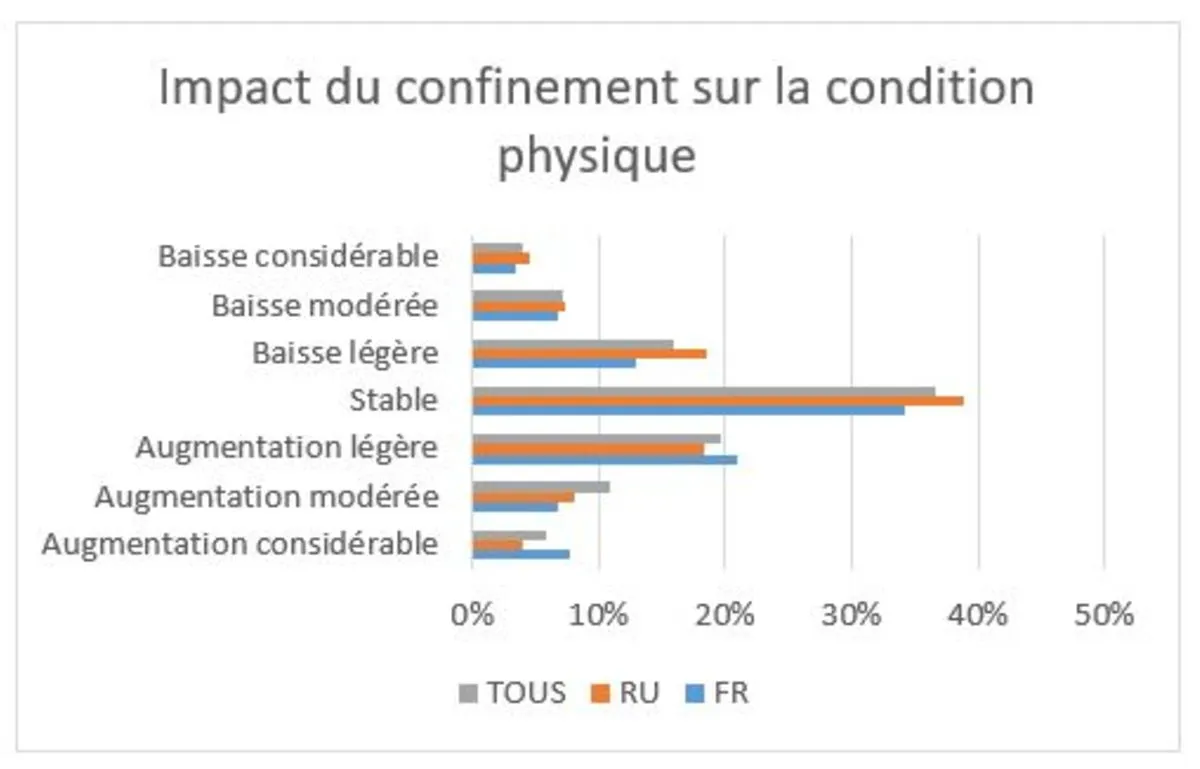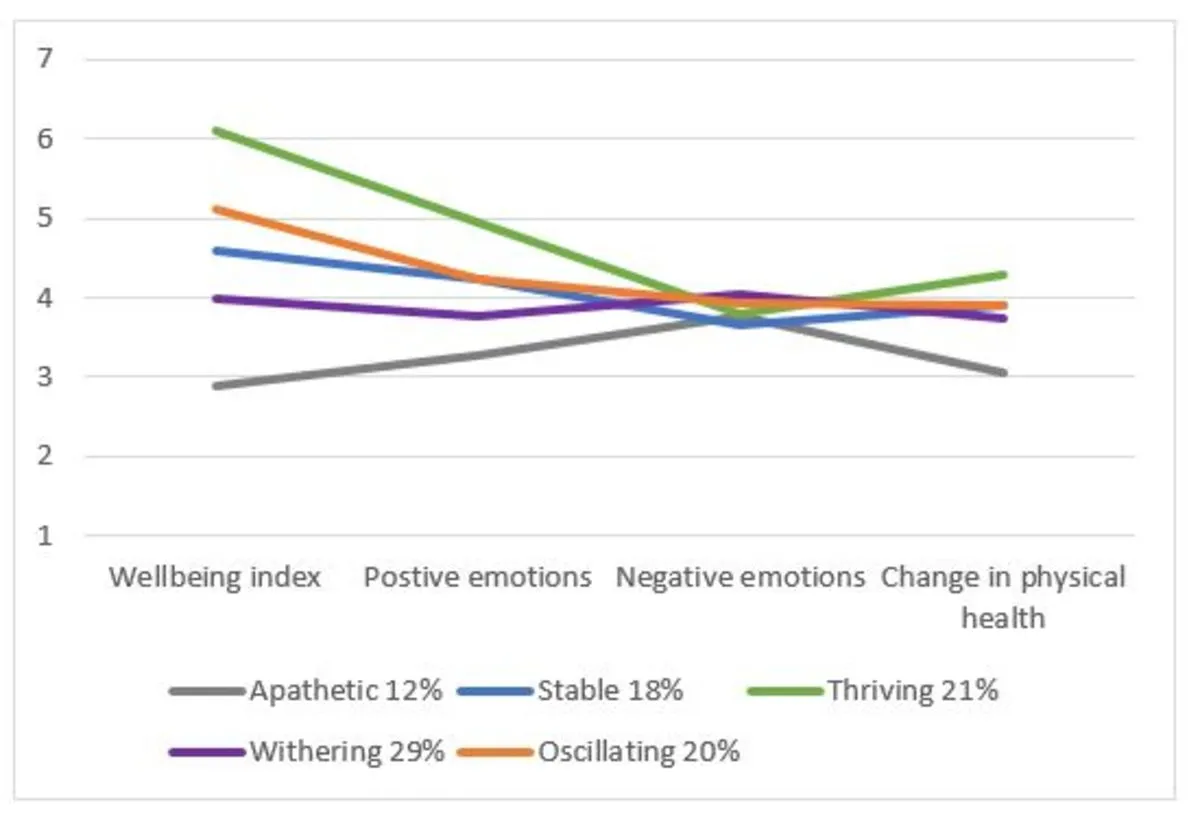Flourishing or apathetic? A study about the impact of lockdown on wellbeing in France and UK
Characteristics that mean you thrived or withered in lockdown have been identified in new research by emlyon business school.
The researchers, from emlyon business school's Lifestyle Research Center, have extensively studied people's lifestyle, circumstances, and behaviour during the Covid-19 lockdown period, to examine how it has impacted people's mental and physical wellbeing, and collated five personal profiles.
The data comes from a survey of over 1000 respondents, split evenly across France and the UK, gathered near the end of the lockdown period in May.
The study covered a number of relevant areas of everyday life that were likely to be affected by the lockdown. These include changes in individuals reported physical and psychological wellbeing, work/study situation, financial situation, and consumption patterns including eating habits, socialising, exercising, and media consumption. The researchers also compared people's characteristics such as gender, age, marital status, education/professional background, household size, and income during lockdown, to their wellbeing.
Professor Joonas Rokka, Director of the Lifestyle Research Center at emlyon, says, “France and the UK have been among the European countries most hurt by the Covid-19 virus. Both countries imposed numerous important limitations on the daily lives of citizens: controls of travel and movement within and outside cities, closing of commercial services and workplaces, closing of public spaces, and so forth. The countries have experienced serious immediate impacts on their welfare and economic activity.”
The five wellbeing profiles are based on respondent's similarities in terms of several social-psychological factors, as well as frequency and strength of positive or negative emotions throughout lockdown. These five profiles are described as; Thriving, Oscillating, Stable, Withering, and Apathetic.
Thriving – 20% of the UK, and 21% across both countries
This group reported the most positive overall wellbeing, based off a number of psychological measures including the frequency of strong positive emotions (such as joy, happiness, contentment) compared to negative ones (such as fear, anger, sadness) during the lockdown. Most likely to include members with the following characteristics:
- Majorly increased physical health
- No impact on household finances
- Generally high net income
- Living with a number of people
- Married
- Women
- 45+ years old (dominant age group)
Oscillating - 17% of the UK, and 20% across both countries
Second best overall wellbeing was found in this group, where the respondent experienced strong positive emotions, and some negative emotions too during the lockdown. Characterized by:
- Slight changes in physical health either for better or worse
- Little or no impact on their household finances
- Generally high net income
- Living with a number of people
Stable – 17% of the UK, and 18% across both countries
Where the respondent reported virtually no strong positive or negative emotions during the lockdown. Characterized by:
- No change in their physical health
- Little impact on their household finances
- An average net income
Withering – 32% of the UK, and 28% across both countries
Negative wellbeing was reported in this group, where the respondent also experienced a higher frequency of negative emotions compared to positive during the lockdown. Characterized by:
- A slight decrease in physical health
- Significant impact on their household finances
- A low net income
- Lived in the UK, not France
Apathetic – 13% of the UK, and 12% across both countries
The most negative overall wellbeing, where the respondent experienced frequent and strong negative emotions during the lockdown. Characterized by:
- A strong decrease in physical health
- Very significant impact on their household finances
- A low net income
- Lived alone
- Single
- Male
- 18-24 years old (dominant age group)
It's clear from our research that people in the UK and France are definitely split between those who thrived and those who suffered during the lockdown. We show that the change on physical health was most dramatic for those who were less thriving psychologically. While the single most important factors explaining members' likelihood to belong to most thriving group or suffering in terms of overall wellbeing were the changes in financial situation, number of people living together, marital status, gender and age.
This is the first study to have examined how the Covid-19 lockdown has impacted lifestyle consumption patterns and wellbeing – an issue that has currently received little empirical investigation and international comparison. Given that the lockdown has significantly restricted the lives of many European citizens, it has until now, been unclear especially how these actions have translated in changes in everyday behaviour, but also on mental and physical wellbeing experienced by people.
The findings of the study, and the impact of a lockdown on people's physical and mental wellbeing, are likely to become even more important with much talk of further lockdowns across the world, caused by another outbreak of Covid-19.
Notes to the editors:
emlyon business school's Lifestyle Research Center
The Lifestyle Research Center was founded by emlyon business school to foster expertise and knowledge on the important area of lifestyle-related markets shifts and branding. The center embodies multidisciplinary perspectives and draws from fields as diverse as consumer and marketing research, organization research, sociology, and computer science. The center regularly publishes research on key issues relevant to understanding contemporary lifestyles including consumer and service experiences, tastes, branding, sustainability, and advances on innovative research methodologies.
The researchers involved within this study are:
Joonas Rokka, Director, Professor of Marketing
Karine Raïes, Professor of Marketing
Massimo Airoldi, Professor of Marketing
Lotta Harju, Professor of Organizational Behavior
Maira Lopes, Post-doc researcher
Vincent Dewaguet, Research assistant
Supplementary graphs – these can be used with credit to 'emlyon business school'

Figure 1: Lockdown's impact was unequally divided (reported change in physical health)

Figure 2.Wellbeing profiles during lockdown, n=1040 (7= positive, 4= stable/no change, 1=negative)
For further information:

